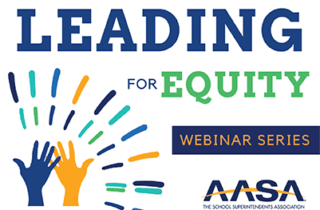Equity—making sure each student receives the specific resources, support, and opportunities they need to succeed—is a process. It can neither be planned for nor achieved all at once, and the target keeps moving, as was discussed during the edWebinar, “How to Improve Equity: One Step, One Goal at a Time.”
As school districts have become more diverse and focused on the importance of providing an equitable education for students from different cultures, the need has grown for a consistent and effective approach to improving the achievement of all learners and engaging their families in the process.
Presented by Dr. Liz Brooke, CCC-SLP, Chief Learning Officer, Lexia Learning; and Dr. Suzanne Carreker, CALT-QI, Principal Educational Content Lead, Lexia Learning
Moderated by Lori Kirksted, Senior Content Marketing Manager, Lexia Learning
The pandemic, while a great disruption in schools, is also an opportunity for change. According to presenters of a recent edWebinar, hosted by AASA, The School Superintendents Association and AASA’s Leadership Network, as school leaders look to reopen their schools, they shouldn’t just be focused on logistics. In addition, they need to ask themselves: Is my school truly responsive to student needs, and if not, how can I make the school work for all students?
If implicit bias is unconscious and something that everyone experiences, how can educators prevent, or at least minimize, its impact on students? During a recent edWebinar, hosted by AASA, The School Superintendents Association and AASA’s Leadership Network, Dr. Bryant T. Marks, Sr., Executive Director of the National Training Institute on Race and Equity at Morehouse College, explained how increasing awareness and then taking effective, data-driven action can result in more equitable treatment of diverse students.
Ending systemic injustices and dismantling long-standing barriers isn’t easy, and district leaders engaged in the process recently identified procedures and tools that have helped them support and guide their districts during their “equity journeys.” During an edWebinar hosted by AASA, The School Superintendents Association and AASA’s Leadership Network, Dr. Leila Nuland, Managing Director of the K-12 Research Team at Hanover Research, explained how district leaders can compile and utilize data on educational equity. Then, Dr. Daryl Camp, Superintendent of the San Lorenzo Unified School District in California, and Dr. Gregory Hutchings, Superintendent of the Alexandria City Public Schools in Virginia, discussed the priorities and processes they have established to increase equity in their districts.
While equity requires vision from its leaders, it also requires courage. During the edWebinar, “Leading for Equity: Courage to Lead with an Equity Agenda,” hosted by AASA, The Superintendents Association and AASA’s Leadership Network, Dr. Khalid Mumin, Superintendent of Reading School District (PA), and Marlon Styles, Superintendent of Middletown City Schools (OH), discussed the challenges they faced and the tough decisions they made to keep their equity agenda moving forward.
Can a new type of curriculum actually turn failing schools into successful ones, and result in greater success for students as well? This question was answered affirmatively and with confirming evidence during a recent edWebinar, hosted by AASA, The Superintendents Association and AASA’s Leadership Network, with educator and author Jay McTighe, and the superintendent and deputy superintendent of Mount Vernon City School District (NY), Dr. Kenneth Hamilton and Dr. Jeff Gorman.
Preparing all students for college and 21st century careers can no longer be the sole responsibility of K-12 educators. Increasingly, district administrators need to add another task to their already long checklists—forging partnerships with organizations that can supplement and enhance the education being provided by local schools.
As schools reckon with learning equity, they’re often focused on academic progress. During the edWebinar, “Leading for Equity: Academic Development Through an Equity Lens,” hosted by AASA, The Superintendents Association and AASA’s Leadership Network, the presenters talked about the important role social-emotional learning (SEL) plays in the process. In fact, they argued that schools must connect academic equity with SEL if they’re going to reach their goal of serving all students.



